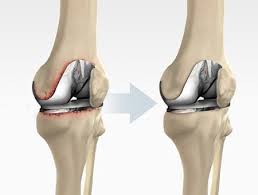Revision knee replacement surgery is a procedure done to replace a worn-out or damaged knee implant from a previous surgery. It’s a more complex operation than the original knee replacement but can help restore mobility and alleviate pain when complications arise.
Understanding Revision Knee Replacement Surgery
When a knee replacement fails due to wear and tear, infection, or alignment issues, revision knee replacement surgery becomes necessary. This advanced procedure involves removing the old implant, preparing the joint area, and placing a new one to restore function and alleviate pain. As it is more complex than the initial surgery, revision surgery demands specialized techniques to address challenges such as bone loss, tissue damage, and implant stability.
Revision knee replacement recovery often involves personalized rehabilitation strategies to meet individual patient needs, particularly in more complicated cases. Patients undergoing revision knee replacement surgery may require additional bone grafts or customized implants for enhanced support. Comprehensive post-operative care—including physical therapy and pain management—is vital to ensuring a successful recovery from revision knee replacement and significantly improving long-term mobility.
Why is Revision Knee Replacement Surgery Needed?

Revision surgery addresses several issues:
- Implant Loosening: Over time, the implant may no longer stay attached to the bone.
- Infection: An infection can make it necessary to remove the implant.
- Misalignment: Poor positioning of the original implant may lead to pain or instability.
Signs You Might Need Revision Surgery:
- Instability or difficulty walking.
- Persistent knee pain.
- Swelling around the knee.
This is particularly important in knee replacement in young patients, where longevity and joint function are critical.
Revision Knee Replacement Recovery
Recovery from revision knee replacement takes longer compared to the initial procedure, as it is a more complex operation involving the removal and replacement of worn-out or failed implants. Patients can expect a hospital stay of several days, followed by a structured rehabilitation program to regain mobility and strength.
Revision knee replacement recovery also involves adapting knee replacement recovery tips, such as careful wound care, using mobility aids, and engaging in prescribed exercises for long-term success. Physical therapy plays a crucial role in recovery, helping to restore joint function and reduce stiffness. Pain management, proper wound care, and a balanced diet support healing. While full recovery from revision knee replacement may take several months, advancements in surgical techniques and post-operative care have significantly improved revision knee replacement surgery outcomes, enhancing long-term mobility and quality of life.
Immediate Recovery:
- Hospital Stay: Revision knee replacement recovery patients typically stay in the hospital for 2–3 days.
- Pain Management: Medication is provided to manage discomfort.
Long-Term Recovery:
- Physical Therapy: A crucial step to regain strength and mobility.
- Healing Time: Revision knee replacement recovery can take 6 months to a year.
Tips for a Smooth Recovery:
- Follow your doctor’s advice strictly.
- Engage in physical therapy exercises daily.
- Maintain a healthy diet to support healing.
Knee Replacement Recovery Tips for a Faster and Smoother Healing Process

Recovering from knee replacement surgery requires patience, commitment, and the right approach. Following these Knee Replacement Recovery Tips can help speed up healing, reduce discomfort, and restore mobility. Start by following your doctor’s post-surgery care plan, including pain management and physical therapy. Gentle exercises like walking and stretching improve flexibility and prevent stiffness.
Maintain a nutritious diet rich in protein, calcium, and vitamins to support bone and tissue healing. Keeping the surgical site clean helps prevent infections, while using assistive devices like crutches ensures safe movement. Stay active but avoid high-impact activities that may strain the knee. Rest and elevate your leg to reduce swelling, and always attend follow-up appointments for proper monitoring. Adopting these strategies will enhance recovery and help you regain strength and mobility effectively. Whether you’re undergoing a total or partial knee replacement, these Knee Replacement Recovery Tips will aid in a smooth transition back to daily activities.
Knee Replacement for Young Patients – Is It Necessary?
For many young patients, chronic knee pain is not just a minor inconvenience; it can be debilitating. The causes range from sports injuries to degenerative diseases, such as arthritis, which can strike at any age. When medication, physical therapy, and other treatments no longer provide relief, knee replacement in young patients may be considered.
But is it always necessary? For some, delaying the surgery may lead to a lower quality of life and further damage. In these cases, the potential benefits of knee replacement far outweigh the risks. The goal is to improve mobility, reduce pain, and allow young patients to lead active lives once again.
Key Stages of Recovery:
- Week 1–4: Focus on basic movements and pain control.
- Week 5–8: Begin strength-building exercises.
- Month 3 and Beyond: Work on returning to everyday activities.
Challenges During Recovery:
- Longer healing time compared to the first surgery.
- Increased risk of complications like blood clots or stiffness.
With patience and dedication, most patients achieve improved mobility and reduced pain.
Revision Total Hip and Knee Arthroplasty
Revision surgery isn’t limited to knees; it also includes revision total hip and knee arthroplasty, which addresses issues such as implant failure, infection, or joint instability. These procedures are more complex than primary joint replacements and require specialized surgical techniques to restore function and mobility. Patients undergoing revision surgery benefit from advanced implants, improved surgical methods, and comprehensive rehabilitation programs. Proper pre-surgical planning, physical therapy, and post-operative care play a crucial role in successful recovery. Whether for the hip or knee, revision total hip and knee arthroplasty helps patients regain mobility, reduce pain, and enhance their overall quality of life
What is Arthroplasty?
Arthroplasty is a surgical procedure that replaces damaged joints, commonly in the hips and knees, to restore mobility and relieve pain. Over time, some joint replacements may fail due to wear, infection, or instability, requiring a second procedure known as revision arthroplasty. This surgery is more complex than the initial replacement, as it involves removing the old implant, addressing any bone loss, and placing a new prosthesis. Patients undergoing revision surgery need proper medical evaluation, physical therapy, and post-operative care for a successful recovery. With advancements in surgical techniques, revision arthroplasty helps restore joint function and improve quality of life.
How It Differs from Initial Surgery:
- Requires specialized surgical expertise.
- Takes longer in the operating room.
- Demands more intensive post-operative care.
Whether for hips or knees, revision surgeries aim to restore joint function and relieve pain. These considerations are particularly relevant in knee replacement in young patients, where the need for longevity and optimal function is even greater.
Preparing for Revision Knee Replacement Surgery
- Proper preparation ensures better outcomes from revision knee replacement surgery by minimizing complications and promoting a smoother recovery. This procedure is typically performed when a previous knee replacement fails due to implant wear, infection, instability, or bone loss. To enhance surgical success, patients should undergo a comprehensive pre-operative evaluation, including blood tests, imaging scans, and a review of medical history. Managing underlying health conditions such as diabetes, hypertension, or obesity is also crucial in reducing surgical risks.
- Engaging in pre-surgery physical therapy helps strengthen the muscles around the knee, improving post-operative mobility and reducing stiffness. Patients should also discuss their medications with their doctor, as certain drugs may need to be adjusted before surgery. Mental preparedness plays a role as well—understanding the recovery timeline and setting realistic expectations can ease anxiety and improve compliance with rehabilitation programs.
- Post-surgery, following a structured recovery plan is key to achieving the best results. This includes regular physical therapy, proper wound care, a balanced diet, and pain management strategies. Avoiding high-impact activities and maintaining a healthy weight can further enhance long-term outcomes. With proper preparation and dedicated post-operative care, revision knee replacement surgery can restore knee function, relieve pain, and significantly improve the patient’s quality of life..
Steps to Prepare:
- Consult a Specialist: Find an experienced orthopedic surgeon.
- Pre-Surgery Tests: Blood tests, imaging, and fitness evaluations are essential.
- Mental Readiness: Understand the process and set realistic recovery goals.
Choosing the Right Surgeon:
- Look for a doctor experienced in revision total hip and knee arthroplasty.
- Seek recommendations and read patient reviews.
Conclusion
Revision knee replacement surgery in Chennai, surgery is a second chance for individuals experiencing pain, instability, or implant failure after an initial knee replacement. This procedure is more complex than a primary knee replacement, often requiring specialized implants and advanced surgical techniques to address issues like infection, implant wear, or bone loss. Recovery from revision knee replacement surgery typically takes longer, but with the right approach, patients can regain mobility and experience long-term pain relief. Physical therapy plays a crucial role in strengthening the knee, improving flexibility, and ensuring proper joint function. Adhering to post-surgery guidelines, such as managing weight, avoiding high-impact activities, and following a rehabilitation plan, significantly enhances recovery outcomes.
Read also Knee Replacement in Young Patients




